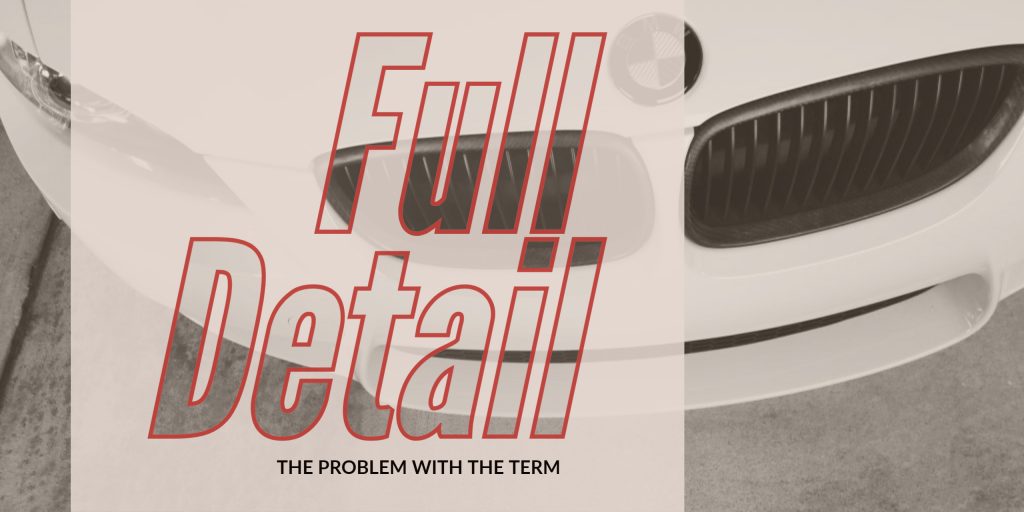
Detail? Full Detail? I want a Full Detail!
I would like to share some of the requests I have had when a potential customer asked for a full detail:
- “I am looking for a full detail? You use a clay bar right?”
- “Full detail. I just want the outside washed?”
- “Just a good vacuum of the interior.”
- “The last detailer didn’t do the cupboard and crevices.”
- “Polish and maybe a sealant.”
- “Just the carpet and seats shampooed.”
- “The seats will need to be taken out.”
All of these requests started with a phone inquiry asking for a price for a Full Detail (terms I do not use). I have had a full detail inquiry turn into a multiple polishing step paint correction, headlight restoration, interior clean, and 1-year ceramic coating application. Although I hope you see the issue here, many of these potential customers are genuine and can only describe what a detail is by their own experience.
You are not alone customers! When professional detailers ask each other how long it takes to perform a Full Detail, answers range from 1 hour to multiple days. These answers often spark a furious debate amongst professionals as to what a Full Detail really is.
Customers are looking for a service in an industry with very little regulation or standardization on service offerings (including quality expectations), safe product use (for the car long-term), and pricing. If the word detail can be the cause of misunderstanding and confusion, imagine the disappointment the use of a generic term like Full Detail has.
Communication is king! I said it before and I will say it again. Not all detailing is the same, and that is okay! I have never begrudged anyone for not being interested in my services. Oftentimes mutual frustration can easily be prevented with better overall communication from all parties, and more thoughtful advertisement of services. I do believe the still widely accepted terms ‘full’ and ‘complete’ are a major source of the problem with customer disappointment and business owner frustration.
Professionals reading this article with exuberance, I have a message for you as well. It is YOUR RESPONSIBILITY to COMMUNICATE what kind of business offering you have. If you are not in an ideal situation to discuss options with every potential client what your service offering includes, or excludes, I highly suggest reevaluating your language use. Words like PERFECT and FULL can create future unsatisfying experiences for you and the customer because they are the subject of misinterpretation. As detailers (myself included) we have to remind ourselves that prospective customers do not know the process or terminology of what is happening to their car when it is in our possession.
Good communication includes asking questions about problem areas of their car and what they did not like about previous detailing services. Communication also means saying you may not be the right fit for someone, instead of setting you and the customer up for disappointment.
Many people ask why I require in-person consultations. From my perspective, it is to protect myself and also to set good mutually agreed-upon expectations. Also, it is meant to protect the consumer from his or herself. I often talk people down from services that they initially want but realize later they do not need. I find potential solutions to problem areas they may not realize existed or could be fixed. There is nothing better for both sides, shaking someone’s hand and looking over a car together.
Although it may be unrealistic to have 30 minute, in-person consultations with your customers, there are additional ways to be on the same page with customers. Do your best to limit or refrain from using generic terms. If a potential customer asks for a full detail repeatedly, ask them what they think a full detail is. If you are someone looking for a detail, treat being asked exploratory questions as a positive sign a business owner cares and is not just trying to take your money.
Jonathan Michael Monson, (owner of Dirty 2 Dreamy Detail) stated, “I teach every detailer I ever train with or hang out with to throw the terms ‘full’ and ‘complete’ right in the garbage can and never use them again. Those terms are subject to interpretation and will lead to complaints and miscommunication.”
